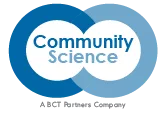Since 1997, Community Science has been recognized for its expertise and knowledge in the development, implementation and evaluation of comprehensive community and other large systems change initiatives. We know that comprehensive community initiatives (CCIs) must develop an infrastructure that enables community institutions to support initiative goals. To engage a community at the level needed for comprehensive change, organizations must have the capacity to address community needs and promote well-being. Community Science facilitates the assessment, planning, and management of these support systems to help ensure that long-term capacity to make change is embedded in local communities.
For those interested in learning more and want to know what is really working in Community Change Initiatives, here’s a brief overview of three current Community Science projects.
Crossroads Charlotte
Community Science is working with The John S. and James L. Knight Foundation to learn about the impact of the Foundation’s grant making in Charlotte, North Carolina – a community trying to address the challenges of its impressive growth and nurture its diverse neighborhoods by providing a sense of place that attracts newcomers. Community Science was brought on board by the Foundation to help identify the major strengths and opportunities of its successful Community Change Initiative known as Crossroads Charlotte that can be used in future expansion of the program. We are conducting interviews with community leaders and hosting technical assistance sessions to maximize the impact of the Foundation’s grant.
Building Healthy Communities Community Capacity Assessment
Community Science continues to work with The California Endowment (TCE) on executing its strategic vision – bringing about community change in order to make measurable differences in improving the health of underserved communities and in creating environments where children are healthy, safe and ready to learn. The initiative is called Building Healthy Communities. Fourteen California communities are participating in the initiative. The Endowment engaged Community Science to evaluate the implementation and outcomes of this ambitious initiative and to provide ongoing feedback on its progress. Currently, our efforts are focused on assessing the community’s capacity for change – to determine the capacity of the 14 communities participating in the project. The assessment instrument, based on TCE’s vision and experience and scientific and practice literature, has already successfully completed its pilot testing and efforts are well underway in the program’s implementation. The assessment – to our knowledge the first of its kind – examines the most important capacities for changing communities by assessing the capacity of the central collaboration as well as other key organizations and groups. A true community-wide assessment that is manageable and useful! A process has been designed, including manuals, to help conduct the assessment, interpret results and use the information to plan capacity building activities.
Next Generation Community Change
What have we learned about implementing successful CCIs? What works and what doesn’t? The Annie E. Casey Foundation is fully invested in building a better future for millions of disadvantaged children in tough neighborhoods — areas where poverty is concentrated, crime is common, safety is elusive, and essential services are unreliable. The Casey Foundation contracted with Community Science to analyze what the Foundation and other organizations have learned about current and past CCIs. Our role is to assist the Foundation in developing a framework to guide the next generation of CCIs for the foundation. We’ll have more information about this important initiative in future issues of The Change Agents.
